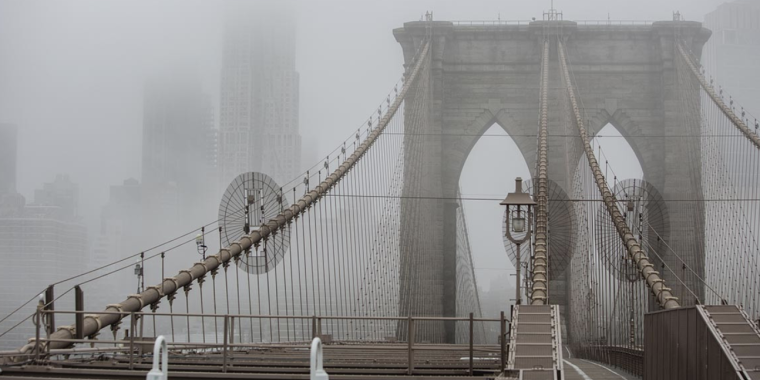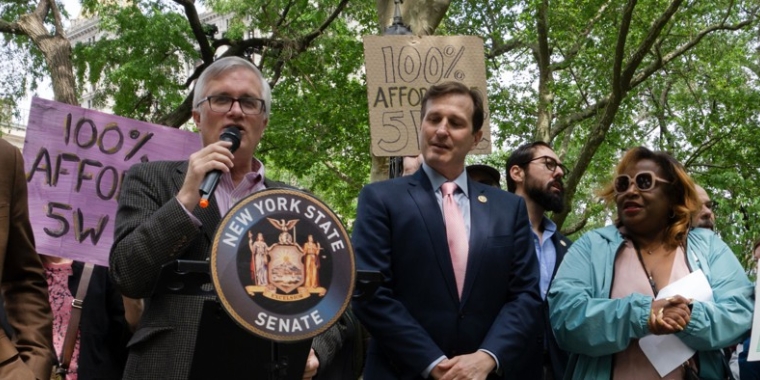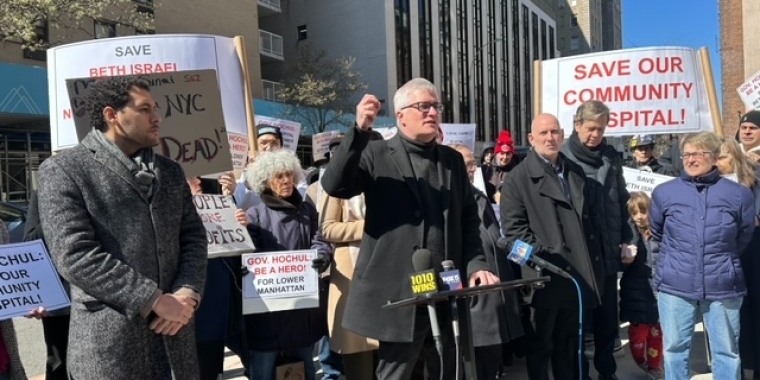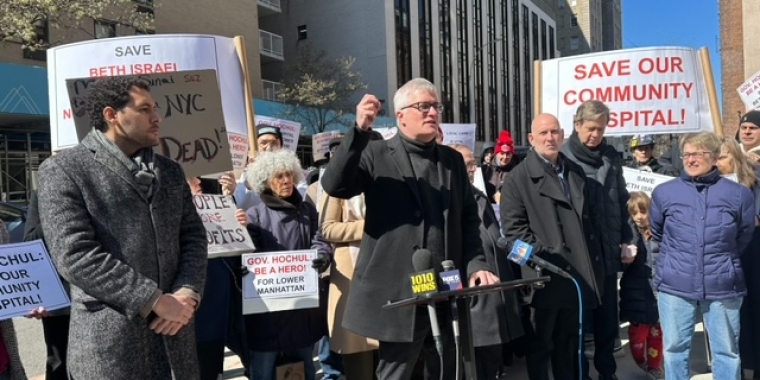Politico: New York is Facing a Potential Explosion in Homelessness

On June 30, 2020, Janaki Chadha of Politico reported on the housing crisis New Yorkers are facing as a result of COVID-19, and the efforts of elected officials and advocates to avert it. The article references the $100 million the State has made available to begin to address the crisis, through the Emergency Rent Relief Act, sponsored by Senator Kavanagh, and cites Senator Kavanagh's call on Congress to provide much larger amounts for rental assistance. The full text of this story is below; the original version is available via the link above.
_______________
New York is Facing a Potential Explosion in Homelessness
By Janaki Chadha
June 30, 2020
Before losing her job this past March, Dawn Miller would spend her entire paycheck on rent each month.
She’s lived in her Flatbush, Brooklyn apartment for more than a decade, and until the coronavirus pandemic hit, had been working at a food kiosk at Brooklyn College. She hasn’t paid rent since being laid off, and though she’s been able to stay in her home though a state moratorium on evictions, she’s facing thousands of dollars in back rent she says she can’t possibly pay back on her own. She’s unsure if her old job will return and hasn’t found a new one.
“It’s very hard to sleep at night,” Miller, 56, said in an interview. “I try not to worry but I’m deeply concerned because I don’t want to be homeless.”
Miller is one of tens of thousands of New York City residents who are behind on months of rent due to the crisis and could lose their homes if a significant amount of government assistance doesn’t materialize quickly.
The city, which faced a persistent homelessness crisis before the pandemic, is staring down a perfect storm over the next two months: the expiration of the eviction moratorium that has kept many New Yorkers in their homes despite not being able to pay rent, and the end to enhanced unemployment benefits that thousands of people depended on since the virus took hold in March.
Those two factors could explode the city’s homeless population at a time when municipal government has scant resources to accommodate the influx and is facing a down economy that experts say will endure for some time.
“What happens is a crisis becomes a catastrophe,” Christine Quinn, executive director of the shelter provider Win and former speaker of the City Council, said in an interview. “If the city just lets things roll, if they just let things happen … the shelters are going to explode.”
Lawmakers acknowledge that without another infusion of federal funds, the city and state will be unable to address potentially billions of dollars in unpaid rent for tenants who have lost jobs or income due to the crisis.
The eviction moratorium Gov. Andrew Cuomo enacted for renters hurt by the pandemic is set to expire on Aug. 20. The $600 in weekly supplemental unemployment benefits from the federal government will end in July, taking away money that experts say has functioned as a sort of rental assistance for the past few months.
The state approved a $100 million rent relief fund in May, but that sum falls far short of the need.
Housing advocates have been pushing another bill, approved by the state Legislature last month, that would prohibit a warrant of eviction against a tenant who has not paid rent due to financial hardship during the Covid-19 state of emergency. But that won't help people who remain unable to pay rent after the state of emergency is over.
Legal services groups and elected officials held a virtual press conference Monday urging Cuomo to sign the legislation. As of Tuesday morning, he had yet to do so. A spokesperson said Monday the governor’s office is “reviewing the bill.”
“We run the risk of having an explosion of homelessness in the city of New York,” Assemblymember Jeffrey Dinowitz, lead sponsor of the bill in the Assembly, said at the press conference.
As of now, thousands who have lost their jobs due to the crisis are facing months of outstanding rent bills. Experts say the unemployment crisis has disproportionately hurt low-wage workers, who are less likely to have enough in savings to make up their arrears, face a dearth of options when looking for a new apartment in their price range and are more likely to end up turning to an already strained homeless shelter system.
“There wasn’t a lot of vacancy and we were already at record-high numbers before this,” Quinn said.
Win authored a report arguing for a significant expansion of eviction prevention programs, including the creation of a new voucher that would address rent arrears accrued during the pandemic. Other service providers and advocates agree that immediate eviction prevention funds that help people with missed rent payments are more cost effective than housing those people in the shelter system. The Coalition for the Homeless estimates keeping a family in their home saves taxpayers $68,422 per year in shelter costs.
Win’s proposals, which also include a new rehousing program for people who end up losing homes due to the pandemic among other measures, will cost up to $2.6 billion. The organization says providing shelter for those same people would cost more than $7 billion.
“Prevention mechanisms are so much more important,” said Catherine Trapani, executive director of Homeless Services United, a coalition of shelter and service providers. “Shelter is really the thing that you don’t want to have to use.”
The city has several existing programs to help tenants on the brink of eviction. But that prevention safety net would likely need to be scaled up at a time when the city and state are strained for resources, and the availability of federal rental assistance funds remains up in the air.
“I'm very, very worried. I think it'll be very bad,” Mayor Bill de Blasio said Monday when asked about the coming end of the moratorium. He said people should not be evicted for non-payment of rent and called on the state to stretch out the moratorium giving people the legal right "to go onto a payment plan that doesn't exist right now.”
The crisis is one de Blasio struggled to make a serious dent in during his first six years in office — years that were defined by a booming economy, historically low unemployment and greater availability of city resources to put toward building affordable homes and new shelters.
The administration fell behind schedule on the mayor’s February 2017 plan to build 90 new shelters across the city over five years. At the same time, advocates have continually criticized the mayor's ambitious, multi-billion dollar housing program for failing to build enough apartments for very low income earners and the formerly homeless.
About 55,000 people slept in city shelters Sunday night, compared to about 51,000 in January 2014, when de Blasio first took office.
Meanwhile, experts predict a slow, uneven recovery of the city’s economy. A recent report from the Center for New York City Affairs said the city could end 2020 with 600,000 fewer jobs than it had at the beginning of the year — a trend the report said will largely hurt low-wage workers.
Homeless service providers and housing advocates say many of the tenants affected by the crisis are people who do not have many good choices if they do lose their homes.
“The vacancy rate for apartments for the lowest income New Yorkers is below 1 percent, so the likelihood of finding a comparable unit even if you had the money is low,” said Shelly Nortz, deputy executive director for policy at the Coalition for the Homeless. “They don’t have savings to rely on, they don’t have that cushion.”
The city is required by law to provide shelter to everyone who needs it, but has lacked enough traditional shelter beds to accommodate the need, instead relying on other options such as hotels. Despite trying to end the practice, the city still had about 3,500 people in hotels before the pandemic hit.
Since then, the de Blasio administration has placed thousands more people into hotels to reduce the spread of the virus in dormitory-style shelters, and homeless advocacy groups have been pushing the mayor to expand the program further.
Meanwhile, tenant groups have been pushing for the cancellation of all rent payments for the duration of the pandemic to prevent a potential wave of evictions.
“Even with this bill, millions of tenants will be unable to pay rent on June 1,” Cea Weaver of the Housing Justice for All alliance said in late May, after the state Legislature passed the $100 million rent relief measure. “They have no resources to pay rent for June, or to cover back rent owed from May or April.”
Landlord associations have slammed the rent cancellation push, and say extending the period of time during which a tenant can’t be evicted will hurt small property owners who have faced their own financial constraints. A report from the Community Housing Improvement Program, a landlord group, found 24 percent of residential tenants and 66 percent of commercial tenants didn’t pay rent in June.
“If they came up with another mechanism by which owners can receive these moneys in the form of some government program, then owners would not need to bring cases in housing court,” said Mitchell Posilkin, general counsel at the Rent Stabilization Association, a landlord group. “But government has failed to come up with a creative response to address not only the concern of tenants but also the legitimate concerns of owners who have their property tax and other bills they’re legally required to pay.”
Asked about rent cancellation, State Sen. Brian Kavanagh, chair of the body’s housing committee, said he thinks a more straightforward rental assistance measure, like the $100 million program approved last month, is a better way to address the issue.
He noted the HEROES Act passed by the House of Representatives would set aside $100 billion in emergency rent relief, $10 billion of which would go to New York under the typical formulas used for such programs. But the measure has stalled in the Senate.
“We need that money to flow … the goal is to get Congress to act and understand that one of the big unmet needs at this point is rental assistance,” he said. Given the fiscal positions of the city and state, “This is going to be a very hard problem to solve without funding.”



